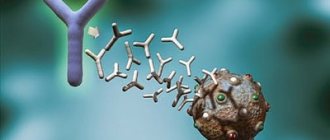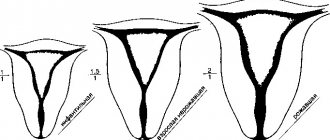If a couple is planning to have a baby, it will be useful for them to know when a woman ovulates and what days are the best for getting pregnant.
To avoid unplanned pregnancy, it is also important to track your fertile window—the most favorable time in a woman's cycle to conceive. The fertile window is the most favorable period for conception. “Fertile window” or when the possibility of conception is maximum. The chance of pregnancy is greatest during the 3-6 day interval ending on the day of ovulation, especially the day before ovulation (the so-called “fertile window”).
An egg ready for fertilization is released from the ovary within 1-2 days after ovulation. It is during this period that a woman’s body is most predisposed to pregnancy. However, you can get pregnant in the previous few days. Spermatozoa retain their motility for 3-5 days. This ability allows male reproductive cells to wait for the release of the egg from the ovary if they entered the uterine cavity before this time.
Menstrual cycle
The fertile window is directly related to the timing of ovulation. The average length of a woman's menstrual cycle is from 28 to 32 days. Some people have shorter cycles, while others have longer cycles.
The first day of menstruation (menstruation, regula) gives the countdown to the menstrual cycle, and is considered its first day. Usually menstruation lasts 3-7 days.
The entire menstrual cycle is divided into two phases:
- the first phase is follicular. It starts from the first day of menstruation. In the first phase, the follicle develops, from which the egg must then be released. The follicular phase ends with ovulation;
- the second phase is the luteal phase. In place of the egg that has already left the ovary, a corpus luteum appears. This structure is responsible for the balance of hormones. They are produced and secreted to prepare the body for the changes that a possible pregnancy will bring. The phase lasts until the start of regulation.
Next, the menstrual phase begins. There is a rejection of the functional layer of the uterus, which was prepared for the possible implantation of a fertilized egg. This is why bleeding from the uterine cavity occurs.
Risk of pregnancy during menstruation
There is an opinion that the likelihood of pregnancy during menstruation is extremely low. But in fact, we should not forget two important points:
1. Sperm in the vagina live up to 7 days
2. A woman’s egg can mature not only towards the end of the menstrual cycle, but also towards the middle of the menstrual process.
Taking into account these factors, the likelihood of pregnancy is extremely low only in the first two days after the start of menstruation, when the most unfavorable environment is created for the sperm.
Do not forget about infectious instability during ovulation. An open cervix is an easily vulnerable target for harmful microorganisms.
Calculation of ovulation date
If the menstrual cycle lasts 28 days, then ovulation should be expected 14 days before the next period. For most women, ovulation occurs between days 11 and 21 of the cycle. However, ovulation does not always occur on the same day. It can happen either earlier than planned or later.
Gynecologists call this period the window of fertility, since these days the body is most predisposed to pregnancy. If a woman ovulates on day 14, then there is a significant chance of fertilization on that day and in the next 24 hours.
The egg lives only 24 hours after ovulation. Ovulation occurs in the middle of the cycle. For most women, the menstrual cycle lasts 28-30 days. It is impossible to get pregnant during menstruation - if it is really menstruation, and not bleeding, which is sometimes mistaken for it.
However, the fertile window opens a couple of days before the egg leaves the ovary. This is due to the fact that sperm can survive in the uterine cavity for up to 5 days. If a woman did not have unprotected sex on days 14 and 15, this is not a guarantee that she avoided pregnancy if she had sex on days 9-13.
It is useful to chart your monthly cycle and track the “symptoms” of ovulation. This will help you determine the exact day of ovulation every month.
Is it possible to have sex immediately after your period?
Most girls are sure that intimate life immediately after the end of menstruation is possible and it is not harmful to health. If sex is not accompanied by pain after menstruation, then there is no threat. This opinion is also supported by the fact that it is impossible to get pregnant at this time. Both postulates are incorrect and therefore subject to careful consideration.
The calendar method of family planning is a popular way to avoid conception. Numbers are stubborn things; approximately 20% of women using this method become pregnant. It is impossible to predict when conception occurred and why sex after menstruation was not a guarantee of safety. The chances of getting pregnant immediately after menstruation, although small, remain. Therefore, only barrier contraceptives become reliable protection against unwanted conception.
Doctors note that the female cycle has become unstable and it is unsafe to have sex using the calendar method. It is affected by:
- stress;
- bad ecology;
- taking medications;
- past illnesses and many other factors.
Therefore, even with a stable cycle, ovulation shifts in days. A woman hoping not to get pregnant does not know what danger she is exposing herself to these days.
Signs of ovulation
By shifting the focus to changes in her state during ovulation, a woman can accurately determine the day when the egg leaves the ovary.
What ovulation symptoms should you pay attention to?
- bloating;
- cramps on only one side of your pelvis;
- increased sex drive;
- headache;
- mild nausea;
- swelling;
- heightened senses such as sight, taste, or smell;
- ovulation pain.
However, some signs continue to change after ovulation. For example, changes in basal temperature (minimum body temperature during rest and sleep) are not a reliable criterion for the appearance of the fertile window.
Many people find it helpful to monitor changes in their body over a period of several months to understand what is normal for their body and what is not. But remember that the time of ovulation may vary from month to month.
There is another option for recognizing the day of ovulation. There are ovulation prediction kits or fertility monitors. Fertility treatments measure the levels of specific hormones in the urine to determine the ovulation period each month. Some of them also identify peak birth days. Using a combination of these methods will help a woman recognize the right day with maximum accuracy.
The table below shows the typical menstrual cycle and the degree of fertility of a woman at each stage:
| Cycle day | Stage | Fertility |
| 1-7 | Menstruation | Lowest chance of pregnancy |
| 8-9 | After menstruation | There is a possibility of pregnancy |
| 10-14 | Ovulatory period | Highest chance of getting pregnant |
| 15-16 | Postovulatory period | There is a possibility of pregnancy |
| 17-28 | Thickening of the uterine lining | Low chance of pregnancy |
Sexual relations in a woman's life
In addition to the fact that sexual contacts are intended for procreation, intimacy plays an important role for the health of sexual partners. Sex has social, psychological and physiological functions. Doctors have carefully studied intimate relationships, and recently two directions have emerged in science - sexology and sexopathology, which study normal and unhealthy sexual processes.
Sexual relations play an important role in the life of a partner. Among the positive qualities of intimate contacts are:
- activation of biochemical processes in the body that occurs during sex (the release of large amounts of adrenaline, burning calories);
- normalization of blood pressure;
- strengthening immunity;
- blood oxygen saturation;
- cardiovascular system training;
- prevention of osteochondrosis;
- rejuvenation of the body;
- decreased levels of anxiety, depression;
- increased concentration and ability for creative thinking.
Women without a regular sexual partner and who do not have sex are more likely to suffer from neuroses. Their chronic pathologies are aggravated, primarily of the cardiovascular system: pressure drops, dystonia, impaired peripheral circulation. Congestion occurs in the small pelvis. In order not to fall into a risk group, constant sex life and adherence to the rules of partner contacts are recommended. It is important to monitor your intimate health and remember safety during sexual intercourse.
Probability of conception
To increase the chances of pregnancy, a woman should have sex without using contraception for 2-3 days before and during ovulation. Sexual intercourse on any of these days increases the possibility of fertilization by 20-30%.
Below is a list of tips that will help increase the chances of a planned pregnancy:
- regular sexual intercourse without the use of contraceptives (sex every 2-3 days);
- complete cessation of smoking by mother and father or reduction to a minimum number of cigarettes smoked per day. Tobacco use reduces reproductive function and negatively affects the health of the embryo and fetus.
- alcohol restriction. Drinking alcoholic beverages reduces fertility in both sexes and also harms the fetus;
- maintaining normal weight. Women who are obese or underweight are more likely to experience irregular ovulation.
However, only a doctor can assess the general health of the couple and the woman’s readiness to bear and give birth to a child. The doctor also determines methods for increasing the likelihood of conception individually for a man and a woman.
Probability of pregnancy with PPA
The PPA method is the timely removal of the penis from the vagina before the onset of orgasm (emission of sperm) in men. Coitus interruptus is used by almost all married, experienced couples, but it is not recommended for practice by beginners of sexual knowledge, young people, and inexperienced partners.
The probability of pregnancy using the PPA method is 27% in healthy couples under 30 years of age. (27 out of 100 women get pregnant when using PPA for 1 year).
But there are limitations to the use of this method related to men's health. Come in and find out the whole truth about PPA: contraindications, effectiveness, incontinence, rate of fire.
How to avoid pregnancy?
To avoid getting pregnant, some women carefully monitor their fertile window. The probability of egg fertilization is lowest in the days before and after this period. However, pregnancy can still occur if ovulation occurs earlier, because sperm remain active for several days after entering the uterine cavity.
Ovulation can also occur later, when a woman thinks that her fertile period is over. Anyone considering this method of contraception should talk to their doctor about the possibility of an unwanted pregnancy and the risks of contracting a sexually transmitted disease.
How long after menstruation can you have sex?
Resuming sexual activity after menstruation can be problematic. Sex after menstruation not only risks infection of the genital tract, but also the risk of pregnancy. Doctors recommend taking precautions. You should not rely on the calendar method of preventing unwanted conception. With a balanced approach to sex, the partner will remain healthy and will not limit the man.
Opportunity to get pregnant and age
Ovulation and your fertile window can change from cycle to cycle, but they also change as you age. The birth rate for women begins to decline at age 35. The quantity and quality of eggs decrease with age. Ovulation may become irregular. Some conditions, such as endometriosis or polycystic ovary syndrome, also make it difficult to conceive.
At fertile age, women are divided into four stages:
- early reproductive stage: from the first menstruation to 20 years. During the first stage, the formation of the cycle, rare ovulation, and balancing of hormonal levels occur. In the case of active sexual activity without contraception, the likelihood of pregnancy is high;
- middle reproductive stage: from 20 to 40 years of age. The middle stage of fertility is characterized by a regular cycle, stable hormonal levels, and the absence (as a rule) of health problems. The most favorable period for pregnancy and childbirth;
- late reproductive stage: from 40 to 45 years. In the later period, hormonal levels are unstable, the cycle and ovulation are stable, and age-related changes in the body begin. Pregnancy is possible naturally, but pregnancy and childbirth may require medical assistance;
- stage of fading fertility: between the ages of 46 and 60 years. During this period, menopause occurs: decreased hormonal levels, irregular cycle or its completion. Natural pregnancy is impossible (with very rare exceptions); pregnancy will require a course of hormonal medications.
What's the result?
It is quite possible to become pregnant during menstrual bleeding. By the 4th day, spotting becomes less abundant, but rather almost unnoticeable. In this case, the sperm may well fertilize the egg or live in the woman’s body and wait for the next ovulation. If you cannot calculate your ovulation cycle yourself, seek help from a specialist.
Although the likelihood of pregnancy is small, to avoid it, experts recommend using barrier methods of contraception during menstruation. Such recommendations are based not only on preventing unwanted pregnancy, but also on protecting the genitals of partners from infection. Bloody discharge is a favorable environment for the development of bacteria; both partners can suffer from it. Therefore, it is better to use a condom.
Return to list
The effect of birth control pills on the ability to get pregnant
Birth control pills are aimed at preventing unwanted pregnancies. Synthetic hormones that are present in the tablets prevent ovulation and thickening of the uterine mucosa.
This means that if an egg is released from the ovary, and fertilization still occurs, then the resulting fertilized egg is not able to implant into the uterine wall. The pill also thickens cervical mucus, making it difficult for sperm to reach the egg.
According to research, the tablets are more than 99% effective when used correctly. But in everyday life, efficiency decreases by 91%. This means that with typical use, 9 out of 100 women will end up becoming pregnant within a year using this method of contraception.
Probability of pregnancy in the days preceding menstruation
This period is considered the safest for unprotected sex, since the likelihood of pregnancy is extremely low. If conception does not occur on the days of ovulation, then fertilizing the egg in the following days until the next ovulation is extremely unlikely (4-5%).
Important! In this situation, the greatest difficulty is to accurately determine the day before the start of critical days. If the cycle is unstable, then the complexity doubles.
The problem of diagnosing pregnancy in the premenstrual period
In the days preceding menstruation, the problem of untimely diagnosis of pregnancy arises: the sperm fertilizes the cell, but the cell does not attach to the uterus, but remains in the tube. In this regard, the girl does not find out about pregnancy until the first delays.
When to see a doctor?
Women who are tracking their fertile window with the goal of becoming pregnant should contact their doctor for early conception planning. The doctor, in addition to identifying factors that reduce the possibility of getting pregnant, will recommend taking special medications or vitamins that will have a beneficial effect on the development of the fetus and the health of the expectant mother.
Those women under the age of 35 who have not been able to get pregnant after a year of trying should consult a doctor, and women over 35 years old should consult a doctor after 6 months of trying. If irregular menstrual cycles are detected, ovulation is constantly absent, this is a reason to make an appointment with a doctor, regardless of age. The cause may be a gynecological disease.
Is it possible to get pregnant while on your period?
Summarizing all the information, we can make several statements:
- You can get pregnant during menstruation;
- the minimum probability of conception is in the first two days of intense bleeding;
- with a decrease in secretion, the chance of fertilization increases;
- immediately after menstruation there is a high probability of becoming pregnant;
- Conception is impossible with anal intercourse.
In women with irregular menstruation, as well as in women who do not monitor the frequency and duration of menstruation, the risk of unplanned pregnancy increases significantly.
MAKE AN APPOINTMENT
[contact-form-7 id=”296" title=”Untitled”]
Abortion and contraception clinic in St. Petersburg - department of the medical gynecological association "Diana"
Make an appointment, tests or ultrasound via the contact form or by calling +8 (812) 62-962-77. We work seven days a week from 09:00 to 21:00.
We are located in the Krasnogvardeisky district, next to the Novocherkasskaya, Ploshchad Alexander Nevsky and Ladozhskaya metro stations.
The cost of a medical abortion in our clinic is 3,300 rubles. The price includes all pills, an examination by a gynecologist and an ultrasound to determine the timing of pregnancy.
Popular questions
1. What is ovulation in women?
Ovulation is the physiological process of the maturation of an egg and its release from the ovarian follicle into the fallopian tube, where the egg can be fertilized. Most women do not feel the onset of ovulation. In rare cases, a symptom of ovulation may be nagging pain in the lower abdomen in the middle of the menstrual cycle, caused by rupture of the follicle at the time of ovulation.
2. How to calculate ovulation?
Ovulation usually occurs on the 14th day of the menstrual cycle. In order to calculate the expected day of ovulation, you should add 14 days to the first day from the start of menstruation. You can more accurately determine ovulation using home ovulation tests and measuring body temperature inside the vagina.
3. Is it possible to get pregnant immediately after your period?
The calendar method of contraception is extremely unreliable because the timing of ovulation can vary depending on hormonal levels. Sperm also have the ability to survive in a woman's genital tract for several days. Pregnancy after menstruation can occur due to early ovulation.
12
9
9
Article rating:
4.61 out of 5 based on 18 ratings
Author: Yushchenko Tatyana Aleksandrovna
Obstetrician-gynecologist, gynecological oncologist. Highest category. Work experience 20 years.
Myths and reality about pregnancy
Since half a century ago, the “calendar” method of birth control was perhaps the most common. Many people probably remember that in Soviet Russia “there was no sex,” so high-quality contraceptives were practically inaccessible for the majority. And doctors unanimously assured that the likelihood of getting pregnant immediately after menstruation is minimal. So the ladies used a pocket calendar to calculate those “happy” days when they could fearlessly benefit their other half.
And since abortion was also not very welcome at that time, thanks to the “calendar” method and its failures, the country’s population steadily increased. Because pregnancy occurred not only among those women who prepared for a magical event in advance, but also among those who did not expect such a gift of fate at all!
It is interesting that, despite all the examples, many ladies still seriously believe that on certain days the risk is minimized - it is usually considered that the safe period begins 3 days before the start of menstruation, continues during menstruation itself and another 3 days after .
But let’s immediately note: minimal and zero possibility are different things, because no one can guarantee that a certain woman at some specific moment will not fall into that very “lucky” percentage for whom the probability of getting pregnant after menstruation will turn into reality!
From a physiological point of view
The low probability that it will be possible to give birth to a new life in the first days after menstruation is associated with the woman’s physiology.
The menstrual cycle consists of four phases. The longest is considered to be follicular; it usually lasts two weeks (plus or minus 4 days), during which time the dominant follicle, which contains an egg ready for fertilization, matures in the female body.
The ovulatory phase is characterized by the fact that the egg is already fully mature and ready for fertilization. She only waits for sperm to appear - and this period lasts from approximately 12 to 17 days. Everything, of course, is very individual, but it is during this period of time, which is called the “fertile window,” that the likelihood of pregnancy is greatest.
A woman’s uterus begins to intensively prepare to receive the embryo of a future life - this is the so-called luteal phase. At this time, the egg is still not gone, and although the hormonal background of the body has already changed qualitatively, conception is still quite possible.
If this does not happen, at the end of the cycle a kind of cleansing occurs - menstruation itself, which, in fact, is the final phase of desquamation. In this case, the endometrial layer is separated and removed from the body along with the unfertilized egg.
This moment is extremely unfavorable for conception; a peculiar aggressive hormonal background interferes with the onset of pregnancy even with unprotected contact. And this continues for several more days after the discharge ends. That is why, when asked about the likelihood of getting pregnant immediately after menstruation, many doctors answer with a categorical “no”.
There are no rules without exceptions
Women, trying to experience the joy of motherhood, carefully calculate the days precisely with the goal of getting pregnant - but for some reason this does not work. The fact is that even during ovulation, the chances of successful fertilization of the egg and that it will “take root” in the uterus do not exceed 30%. Against this background, the probability of pregnancy during the “safe” period seems completely illusory - something like 1-2%. But for those who yearn for motherhood, this chance seems small, and for those who are forced to use protection, it seems like a very frightening percentage.
The fact is that for some women, due to some hormonal characteristics, the menstrual cycle is never fully established. Therefore, the moment of ovulation may shift, and accordingly, conditionally safe days will not be fixed either. Therefore, if your period may not come according to the calendar, but with a shift of 5-7 days, you should be skeptical about the “calendar” method of birth control. For such women, the question is: what is the probability of getting pregnant immediately after menstruation? – the percentage of positive answers is growing exponentially.
The second common reason is that the menstrual cycle is too short. The fact is that all phase calculations are based on a standard cycle, which is usually 28-29 days. But in reality, it happens that it lasts less than 25 days, while the menstruation itself lasts not 3-4 but 7-8 days, and sometimes more. It turns out that the dangerous period begins not on the 12th day, but somewhere on the 8th. So it turns out that your period has just ended (or is still reminding you of itself with bloody discharge!), and the egg has already matured and is ready for fertilization.
And if we also take into account that for many women during menstruation, sexual desire sharply intensifies, sexual intercourse at this time can be not only spontaneous, but also extremely passionate. What is the probability of getting pregnant after menstruation in such a situation? We have to admit that it is very, very large!
"Resort" pregnancy
Any disruption of the menstrual cycle is a hormonal surge in a woman’s body. What can cause it? Yes, for a million reasons - taking medications or some kind of illness, poor diet or increased physical activity. But most often the cause is a variety of stresses, which in modern conditions torment us almost constantly.
Moreover, it should be noted that joyful excitement can lead to cycle failure. For example, those related to going on vacation. As a result, after a luxurious vacation somewhere on the seashore, an unexpected pregnancy can easily occur. And this provided that unprotected sex occurred exclusively during the “safe” period! So on vacation, it is best not to trust only this one method, but to additionally use some other method of contraception.
Tenacious “little friends” can bring a surprise
But let’s assume that a woman’s cycle is “correct” and never goes astray. Can you trust the “calendar” method one hundred percent, and what is the probability of getting pregnant after menstruation in this case? Alas, nothing changes - a small chance still remains.
In this case, it all depends on the partner - in some the sperm are sluggish and non-viable, while in others they can boast of increased vitality. In some cases, sperm, while waiting for a mature egg, can retain their “fighting” qualities for a whole week, being in the genital tract all this time.
In fact, the fertilization process will occur, as expected, during the “fertile window,” but the woman will think that this happened much earlier - after all, unprotected sex happened a week ago!
There is always room for unpredictable accidents in life
There are very rare cases when a woman develops 2 eggs at different times during one cycle. This is called spontaneous ovulation. In fact, such ladies can become pregnant at any time, even during menstruation. No one can explain why this happens, but doctors suggest some kind of genetic predisposition. So, to the question of whether there is a chance of getting pregnant after menstruation, all women who have had similar cases in their family should answer in the affirmative.
Sometimes it seems that pregnancy occurred on the “safe” days after menstruation. In fact, everything happened much earlier, as expected, at the moment of ovulation. The egg was fertilized and implanted in the uterus. But for some reason, part of the epithelium still separated, creating the illusion of full menstruation. The woman has sex after it ends - and after a while she finds out that she will be a mother. And, of course, the “calendar” method fails.
In general, women who want to 100% exclude the possibility of pregnancy should not count the days in anxiety and constant tension, but use another method of contraception. After all, the possibilities of medicine have stepped far forward over the past 50 years!
Factors that cause infertility more often than abortion
Infertility after abortion is associated with significant damage to the endometrium.
However, this is not the only cause of impaired fertility. In the practice of a gynecologist, other etiological factors are more common. Thus, in every 5th patient the inability to conceive a child is associated with endocrine imbalance, which disrupts ovulatory mechanisms. Pathology of the fallopian tubes, in particular obstruction and compression by peritubar adhesions, occurs with approximately the same frequency. Ovarian diseases, endometriosis and uterine fibroids account for 10-20% of the causes of female infertility. Much less frequently (about 5% of cases) other factors occur - cervical polyps or scar deformation, genetic disorders and psycho-emotional disorders. Do not forget that in 20-30% of cases, infertility can be caused by male reasons - poor sperm motility, low sperm count and morphological inferiority. Therefore, in addition to the woman, the second partner should also undergo examination at the same time.
When failures are possible
Many families expect pregnancy but are unable to achieve it. This may be due to instability of the menstrual cycle. The question of how to get pregnant with irregular periods is very relevant for such families. To exclude extraneous factors, you need to:
- give up alcohol and nicotine;
- eliminate stress and anxiety;
- wear comfortable clothes made from natural fabrics;
- do not get sick and do not take medications;
- eat well and properly;
- correctly calculate ovulation.
To successfully conceive a baby, it is useful to consult with doctors. Perhaps endocrine problems do not allow a woman to become a happy pregnant wife.










